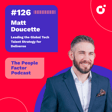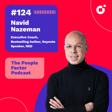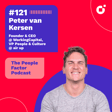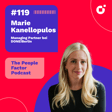
#94 - Yeliz Castillo | Career matchmaker & certified career Coach @pplwise
Yeliz Castillo is a dedicated TA professional starting her journey in London with little English, she embraced the challenge and became fluent in her third language while developing a passion for recruitment. Yeliz thrives on connecting with people, making an impact on their lives, and building meaningful relationships. She values authenticity, collaboration, and stepping out of her comfort zone to pursue her goals. Liz is currently TA Lead & Sr. Talent Partner at pplwise.
Shownotes
00:00 - Intro & Context
05:00 - The Importance of Clear Communication
10:45 - Candidate Feedback Strategy
18:30 - Recruitment Market Dynamics
Guest Linkedin: https://www.linkedin.com/in/yeliz-akin/
Thomas Linkedin: https://www.linkedin.com/in/thomas-kohler-pplwise/
Thomas e-mail: thomas@pplwise.com
pplwise: https://pplwise.com/



















